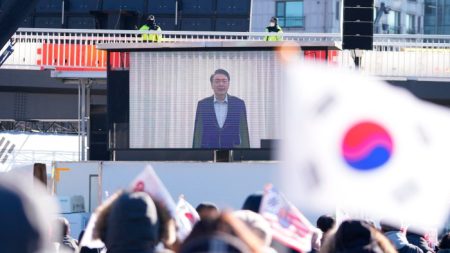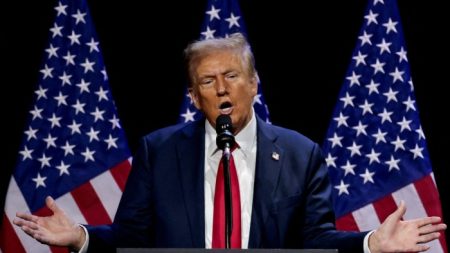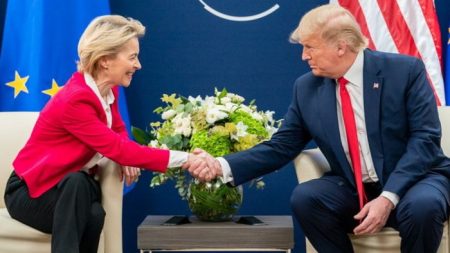Unlock the Editor’s Digest for free
Roula Khalaf, Editor of the FT, selects her favourite stories in this weekly newsletter.
Hamas delayed the release of at least a dozen more hostages held in Gaza on Saturday, saying insufficient aid had been delivered to the besieged strip.
The militant group freed 24 captives on Friday as part of a deal under which Israel agreed to pause its offensive on Gaza for four days, release Palestinians held in Israeli prisons and allow more aid into the coastal enclave.
The temporary truce was holding on Saturday, but Hamas’ military wing said on its Telegram channel that it had “decided to delay” releasing the second batch of hostages until Israel “commits to the terms of the agreement relating to entry of aid trucks to northern Gaza”.
Hamas official Osama Hamdan said the group had complained to the agreement’s mediators, Qatar and Egypt, about issues including insufficient aid delivery. He also alleged that Israeli soldiers had shot at Gazans on Friday as they attempted to move northwards.
Hamas’ military wing “postponed releasing the second 13 captives in order to hear the response from the mediators”, Hamdan told reporters in Beirut.
An official briefed on the situation said: “Both the Israelis and Hamas are in ongoing discussions with the Qataris to resolve the delays as soon as possible.”
Under the four-day agreement at least 200 trucks of aid were to be delivered daily to Gaza, to which Israel has laid siege since Hamas’s October 7 attack triggered the war.
Israel said 200 trucks were entering Gaza via the Rafah crossing with Egypt after going through Israeli security checks. It said in a statement that UN agencies “led the deployment of over 50 humanitarian aid trucks to both the northern Gaza Strip and shelters that have not yet been evacuated”.

The official briefed on the process said Hamas delayed the hostage release because only 60 trucks of aid had reached the strip by the time the exchange was supposed to take place. However, more than 140 trucks in total had arrived in Gaza by later on Saturday, the official added, and negotiators hoped the hostages would still be released.
The official said the agreement was still intact, adding that it was not clear who was at fault for the delay in aid deliveries, which have to transit through Rafah, the only crossing with Gaza that is operating and which is not controlled by Israel.
Aid workers had warned of the challenges of getting large amounts of supplies into the strip because of logistical hurdles and Israeli checks.
Although 200 trucks of aid were dispatched to the Rafah crossing on Friday, only 137 were offloaded in Gaza, the UN said. In addition, 129,000 litres of fuel were delivered.
That was still the largest aid delivery to the strip since October 7 as the coastal enclave, which is home to 2.3mn people, endures severe shortages of food, water, fuel and medicine.
Under the truce agreement brokered by Qatar, the US and Egypt, Hamas will free 50 Israeli civilians held in Gaza in staggered groups over the four-day period, in exchange for 150 Palestinian prisoners and substantial aid deliveries to the strip.

Hamas on Friday freed 13 Israelis, 10 Thai nationals and a Filipino while Israel released 39 Palestinians from prison, mostly women and teenage boys.
A similar number of hostages and Palestinian prisoners were expected to be released on Saturday, the official briefed on the process said.
A team of Qatari officials flew into Tel Aviv on Saturday to co-ordinate with all parties and “ensure the deal continues to move smoothly and to discuss further details of the ongoing deal”, a diplomat said.
Iran-supported Hamas and other Palestinian militant groups are still holding more than 200 people in Gaza, including elderly people and Israeli soldiers, after its fighters launched a savage assault on communities in southern Israel on October 7. Israeli officials said about 1,200 people were killed in the worst attack in the Jewish state’s history.
The Hamas assault triggered a ferocious Israeli military response, including a ground invasion. After six weeks of bombardment in which Palestinian officials say at least 13,300 people have been killed and 1.7mn forced to flee their homes, the temporary truce has given Gazans a brief respite.
The pause in fighting comes as pressure mounts on Israel from allies over the human cost of the war. David Cameron, UK foreign secretary, told the BBC on Friday that “the number of casualties is too high”.
Assaf Orion, former head of a strategic division at the Israeli Defence Force, said that while “Israel has its own interests to decrease the damage to civilian population as collateral . . . at the same time we cannot keep on being, I would say, overcautious and trying to go above and beyond, to do our best in this as we used in the past”.
Violence continued in the occupied West Bank on Saturday, where clashes during a raid by Israeli soldiers killed Shamekh Kamal Abu Al-Rad, a 25-year-old doctor, according to the Palestinian news agency Wafa. The IDF said it was “aware of the claims” and was reviewing the incident.
Read the full article here












